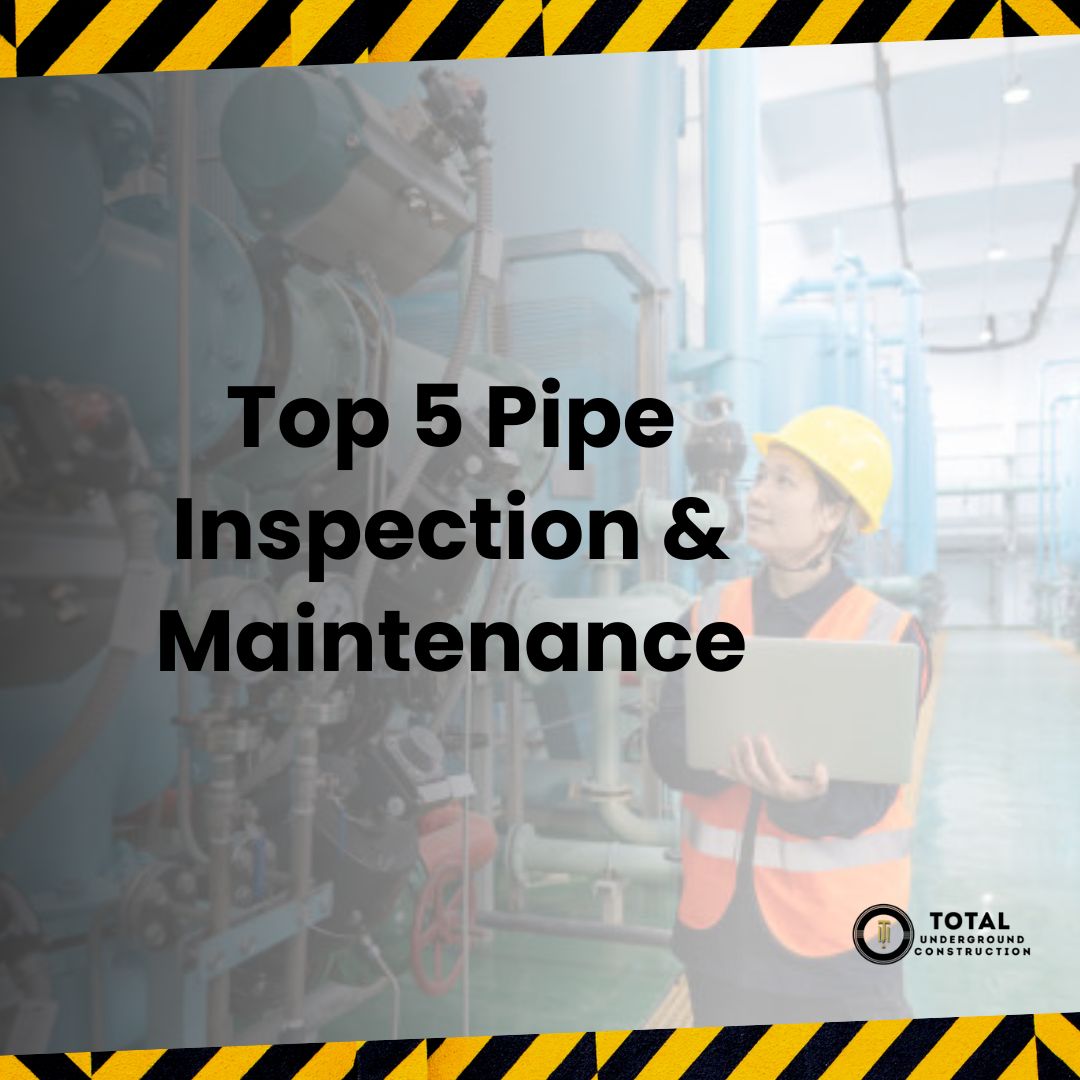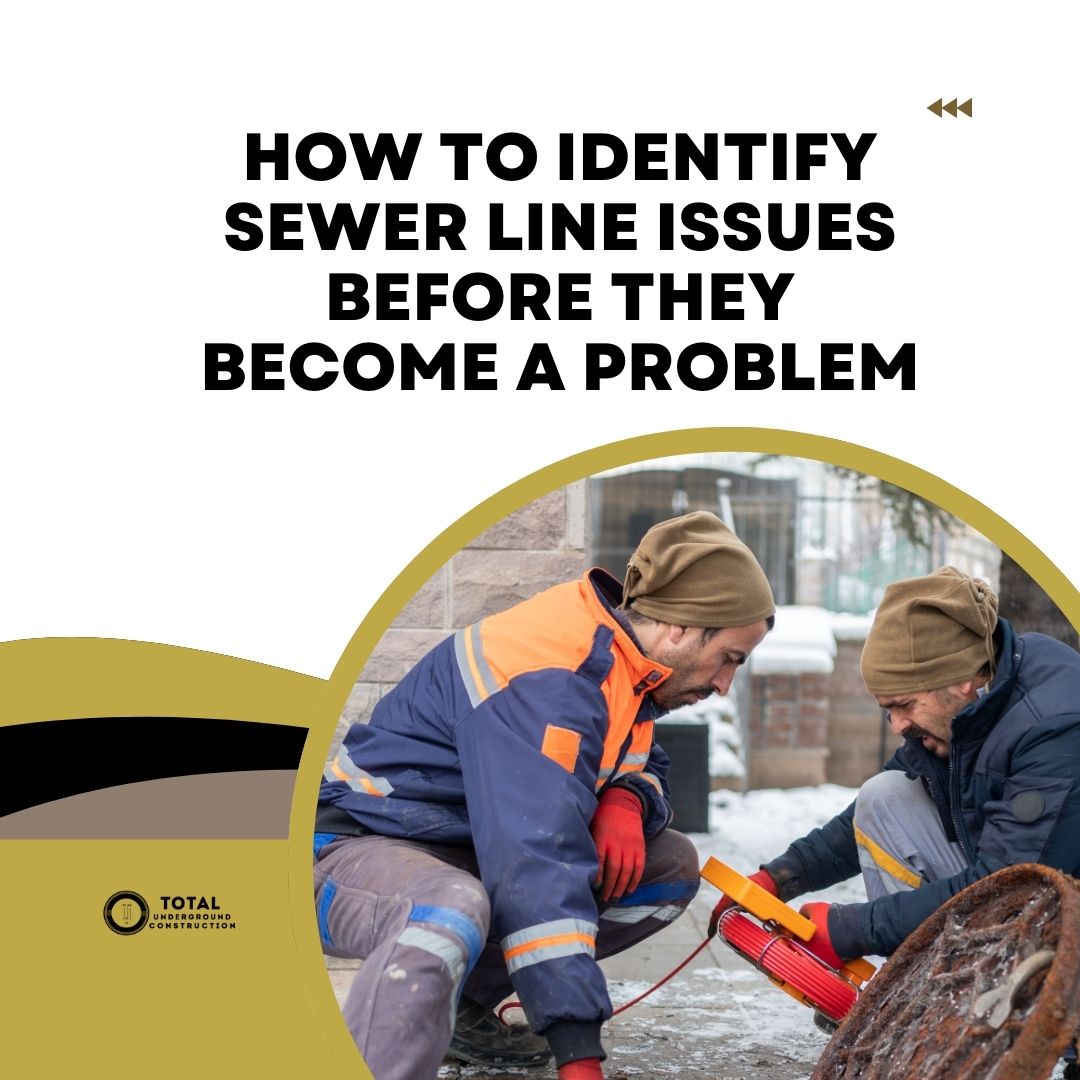Natural gas is an essential but dangerous resource. It has the potential to reduce entire neighborhoods to smithereens without adequate gas line maintenance strategies. A small accident can become a huge explosion in seconds, damaging property and injuring individuals. Gas leaks are health hazards when inhaled in trace or huge amounts.
Every property owner or manager should understand the importance of gas line safety. Proactively identifying, repairing, and maintaining your gas line is crucial to preventing gas line risks. You can DIY preventative approaches or hire a professional contractor to oversee all your gas line-related issues.
The benefits of professional gas line repair include industry-grade services, comprehensive inspections, timely rehabilitation, and peace of mind. The safety of your gas line begins with you. Here is an in-depth gas line repair guide to help you make informed decisions between DIY and professional gas line repairs.
Understanding the Role of Gas Lines in Your Home
What is a gas line? A gas line or gas piping is an infrastructure that brings natural gas from the interstate natural supply gas lines into residential homes. Household gas lines supply natural gas to different appliances, including stoves, water heaters, and heating and cooling systems.
Like other plumbing systems, gas lines need regular maintenance to identify and fix issues, optimize performance, and extend their lifespan. Gas line maintenance’s importance is reducing accident and injury risks, gas bills from leakages, frequent repair costs, and property damage.
The Benefits and Drawbacks of DIY Repairs
Is DIY gas line repair safe or better than hiring a professional contractor to maintain and rehabilitate your gas infrastructure? Both options have strengths and weaknesses. Here is a comprehensive breakdown of the advantages and disadvantages to help you make informed deliberations.
Pros and Cons of DIY Gas Repair
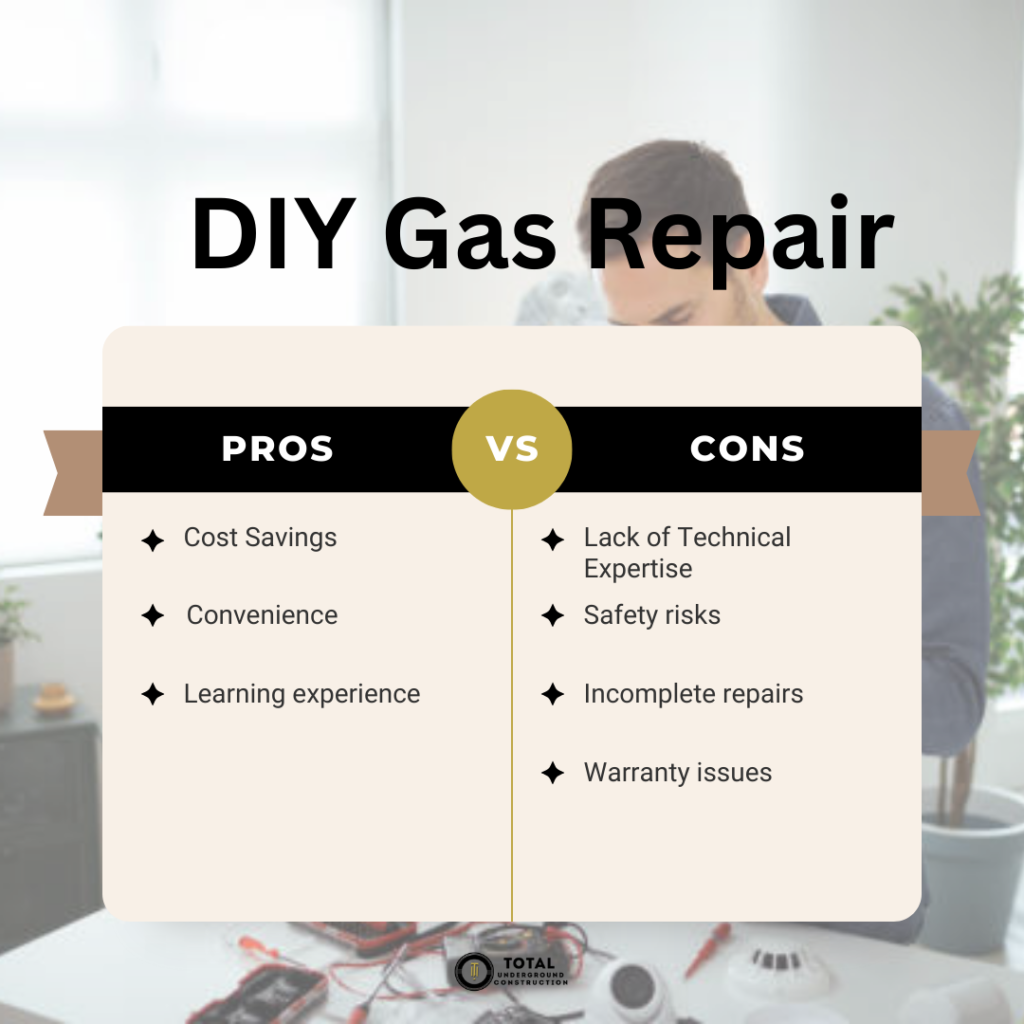
Pros
- Cost Savings: In the short term, DIY gas repairs are affordable. You do not incur labor and gas repair technician costs, which are charged hourly or at flat rates with extra charges for service extensions.
- Convenience: DIY repairs can happen whenever you are available. You do not need to schedule or constrain your hours. The repairs can go on to completion.
- Learning experience: DIY gas line repair expounds your rehabilitation knowledge and skills. You can leverage information on gas line repair tips online to increase your knowledge base and perfect your skills.
Cons
- Lack of Technical Expertise: you are more likely to worsen the problem if you lack primary technical skills, increasing the risk of property damage or injury.
- Safety risks: mistakes are costly when you are dealing with natural gas. Natural gas is highly flammable. It can set your house ablaze in a matter of seconds. Inhaling the fumes can also cause respiratory distress.
- Incomplete repairs: A professional technician’s specialized knowledge, experience, tools, and training are essential to diagnose and fully resolve a gas line issue. DIY repairs may not identify and tackle the problem comprehensively.
- Warranty issues: Gas piping manufacturers give preconditions to validate the warranty period. One of these prerequisites is professional handling of the infrastructure. DIY repair voids the warranty.
Pros of DIY Gas Line Repair
The benefits of DIY gas line repair can entice you into trying to repair your gas line problems. Nevertheless, prioritizing safety is always vital. Experts recommend DIY repairs are only for small, localized gas pipe problems. Always call a certified contractor for complex gas line problems or when unsure of the appropriate repair strategy.
- Cost Savings
The cost of DIY gas line repair is much lower than professional repair. On average, an expert charges around $540 for repairs. Prices can go as high as $1,300. The charge includes inspection, labor, materials, equipment, and inspection. The technician’s costs range between $45 to $150 per hour.
On the other hand, DIY repairs costs only include gas line repair tools and materials. The price can be as low as $200 if you already have the equipment in your tool shade. The cost decreases with higher repair expertise levels.
- Immediate Access
DIY repairs do not require scheduling or appointments. They can happen as soon as you identify a problem. All you have to do is gather your repair tools and wear your protective gear. The ability to act fast decreases the risk of the problem escalating into a costly situation. The risks are minimal if you prioritize safety and perform the repairs effectively.
- Self-Satisfaction
DIY projects boost your confidence and satisfaction in handling problems in your home. It means you can hold the fort or contain a potential hazard. Every successful repair also increases your experience and expertise. Nevertheless, you may need the input of a professional technician to assess the quality of your repair.
Cons of DIY Gas Line Repair
- Safety Hazards
Gas line safety risks are higher in DIY than in professional repairs. You are more prone to errors and omissions due to a lack of expertise and experience. Gas line infrastructure and problems vary. You may not have industry-grade equipment to inspect your system comprehensively.
Unidentified gas leaks pose serious fire and health risks, from potential explosions to the spread of toxic fumes. Damages can be extensive to adjacent properties and infrastructure.
- Legal Consequences
You could face legal issues with DIY gas repair. Home insurance does not cover damages when an uncertified person handles gas line repairs. You have to pay out of pocket in case of an explosion or injury resulting from the repair. The property owner may also file for compensation if you are renting.
- Fines
Attempting DIY gas line repairs without knowledge of local building codes can result in fines from the local government. You can even accrue further penalties if you hit a gas line. In this case, the fine is $500.
- Incomplete Repairs
You could end up with incomplete repairs without quality equipment and repair expertise. The dangers of DIY gas line repair increase with such errors and omissions. The gas could build up inside the pipe, resulting in an explosion. The gas could permeate throughout the house and ignite from sparks. Individuals exposed to the toxic fumes may suffer harm.
- Warranty Terminations
Gas piping manufacturers provide conditions for warranties. One condition is that only professional gas line contractors should handle repairs and replacements. A DIY repair hampers this condition, terminating the warranty agreement.
When Is DIY Viable?
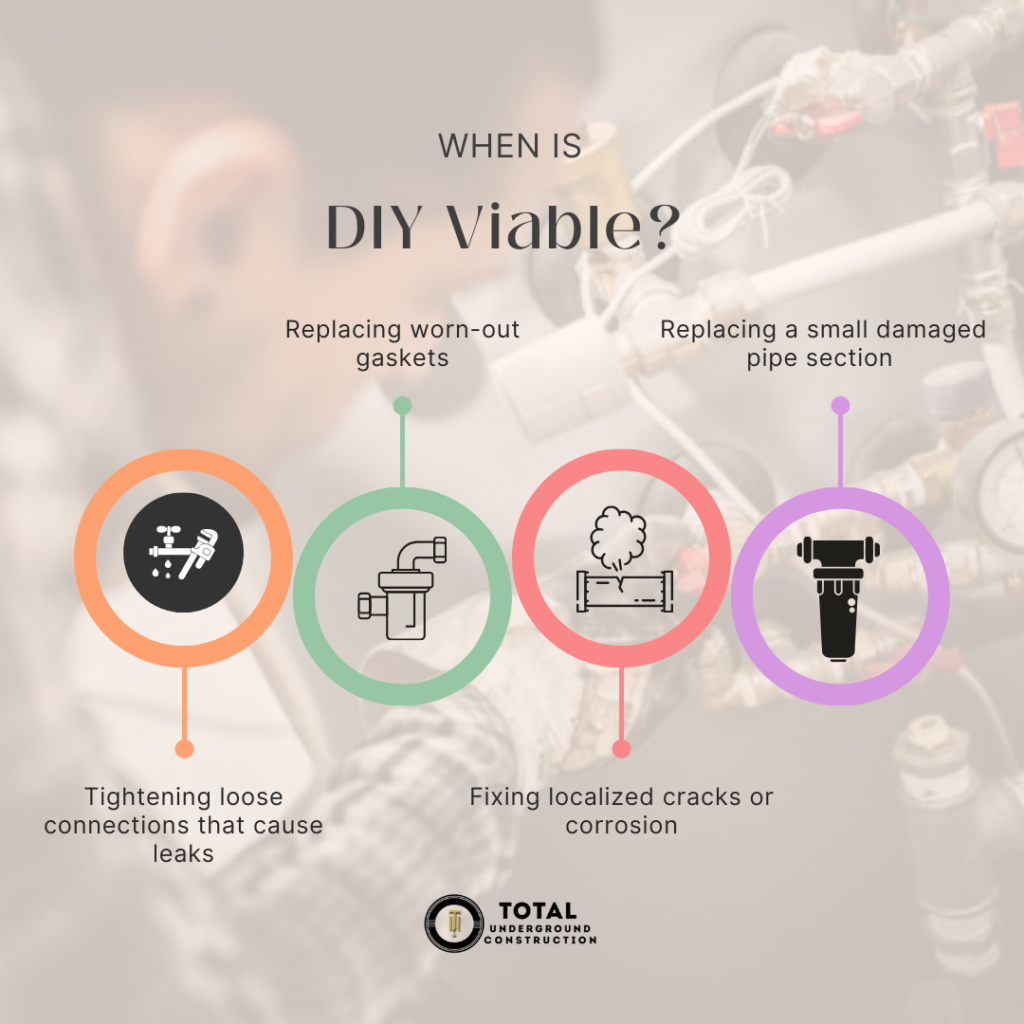
The advantages and disadvantages of DIY gas repair can create confusion on when to do DIY gas line repair. The rule of thumb is only to tackle minor gas line fixes. Leave complex or extensive damages to professional contractors. Here are examples of problems requiring simple gas line repairs.
- Tightening loose connections that cause leaks
- Replacing worn-out gaskets
- Fixing localized cracks or corrosion
- Replacing a small damaged pipe section
Gas Pipe Inspection Tips
The magnitude of the gas line damage determines whether you can fix the pipe yourself or hire a professional technician. Here are ways to identify the extent of damage and make an informed decision.
- Structural damage: What is the damage degree? Identify whether it is superficial or structural. Call a professional contractor if the damage is not superficial.
- Damage Frequency: Note the number of times the leak, corrosion, or crack occurs throughout the pipe. Hire a professional technician if the problem occurs throughout the gas pipe.
- Gas leak extent: Call a professional contractor if the leak is significant or if multiple areas of the gas line are leaking. Evacuate everyone in the building and open every window and door.
Why Hiring a Professional Can Be the Safer Choice
- Enhanced Safety
One of the benefits of hiring gas line professionals is guaranteed safety. A licensed gas line technician has the training, qualification, skill, and industry-grade resources to handle gas piping systems. Part of gas line training entails safety handling and strategizing, from evacuation to secure gas leak detection and problem-solving. Expert handling reduces explosion and toxic fume inhalation risks significantly.
- Expertise
Do you want expert-level repairs? Contract professional gas line repair services. Certified gas line contractors are familiar with gas line issues. Leverage the expert’s knowledge, skills, and efficiency in execution to get your gas line rehabilitated.
- Legal Compliance
Hiring a professional gas line expert complies with local plumbing codes. It eliminates the risks of fines and lawsuits from repair errors. Professional contractors carry insurance and bonding to mitigate potential risks and liabilities during repairs.
- Cost-Effectiveness
Professional gas repair costs may seem expensive upfront, but they are effective in the long term. A professional repair will not require additional fixes. Certified contractors perform rigorous quality assurance tests to ascertain the quality of the repair.
Apart from that, the experts perform thorough inspections to identify every problem, develop accurate diagnoses, and implement comprehensive solutions. Working with contractors also maintains your infrastructure’s warranty period.
Pros of Professional Gas Line Repair
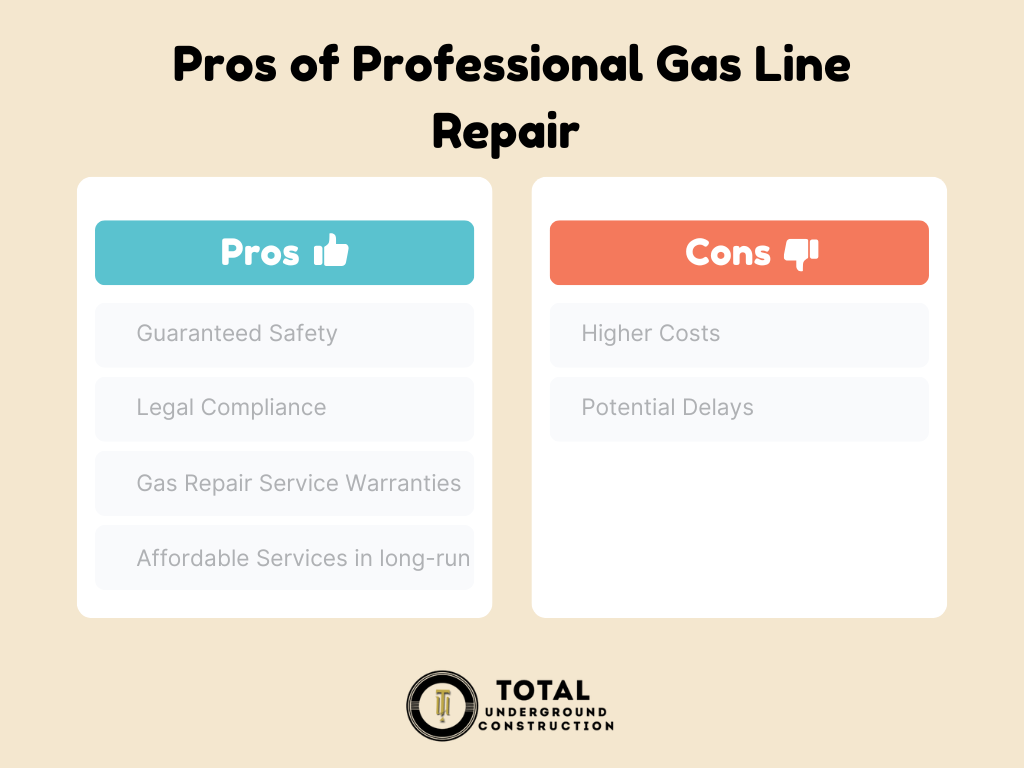
We are gas repair experts at Total Underground Construction. Our clients enjoy numerous benefits when they partner with us to handle their gas line maintenance and rehabilitation projects.
- Guaranteed Safety
The safety of professional gas repair is undisputed. Certified plumbers enforce all safety measures and protocols to minimize injuries and property damage risks. The contractors note every adjacent infrastructure, utility line, and vegetation, taking the necessary precautions to secure the repair site.
Total UC is a licensed, insured, and bonded company. Thus, we comply with all the regulations, maintain ethical practices, and safeguard every life and property within the repair site.
- Legal Compliance
All our repair projects begin with obtaining permits and fulfilling any other legal obligation on behalf of our clients. We comply with every local and state code regarding gas line repairs, from using the appropriate materials to repair techniques.
- Gas Repair Service Warranties
We provide a gas repair service warranty, giving you peace of mind in the unlikely chance that the problem reoccurs. Warranty services are free.
- Affordable Services
We provide pocket-friendly costs compared to industry rates without compromising on service quality. We offer upfront pricing with no surprise costs.
Cons of Professional Gas Line Repair
Hiring a gas line technician has drawbacks despite the enhanced safety and comprehensive repairs. Here are two noteworthy demerits of hiring a professional gas repair contractor.
- Higher Costs
Professional gas repair costs are higher than DIY repair costs. However, professional repairs are a permanent fix, providing a long-term solution. DIY repairs are not long-lasting and might require constant fixes, eventually adding costs.
- Potential Delays
The entire scheduling process can slow servicing, increasing the risk of enhanced gas line problems. Nevertheless, professional technicians provide safety measures as they expedite their response. The contractor may indicate turning off the main gas line valve, opening windows and doors, and vacating the property until dispatched technicians arrive.
Cost Comparison: DIY vs. Professional Repair
Here is a comprehensive DIY vs. professional gas line repair cost comparison.
Average Gas Line Repair Prices
The average cost of a professional gas repair is $540. Prices range between $150 and $1300. A DIY repair for a minor issue will cost you between $150 and $500. Cost variations depend on several factors.
- Tools
A professional gas repair technician already has the tools and equipment to inspect, detect, repair, and test the gas line system. The overall fees may include hourly equipment use or at a fixed flat rate. A DIY project may require purchasing or leasing the repair tools, costing you up to $450.
- Materials
Professional contractors also come with repair materials and include the costs on the overall charge. DIY repairs require buying the materials. Materials needed for a gas line can cost up to $60.
- Permits
The local government charges permit fees depending on the work required on the pipe. Prices range between $25 to $100.
- Labor
Gas line technicians can charge hourly rates or provide fixed rates. Hourly rates can range between $45 to $150 per hour. DIY repair costs do not include labor. However, the overall cost may increase because of potential repairs due to mistakes.
A Table Showing A Comparison Between The Cost of DIY vs. Professional Gas Repair
| Cost Breakdown | DIY Gas Line Repair | Professional Gas Line Repair |
| Tools | Gas leak detector – $185Gas pressure test kit – $20Pipe Wrench – $40Pipe dope – $8.99Pipe fittings – $35Pipe cutter – $140 | Average costs include tool use. Cost may be up to $100. |
| Material | Pipe pieces per linear foot – $15 -$25 Yellow Teflon tape -$5 -$10Sandpaper – $5.99Acetone – $32 per gallon | The average cost is around $50 |
| Permits | $25 -$100 | $25 -$100 |
| Safety Gear | Gas mask – $350Safety glasses – $250Gloves – $5Safety clothing – $100 | Price not included in the overall charge. |
| Labor | Potential additional repairs: $200 per repair | $45 to $150 per hour |
| Total Average Cost | $1000 | $500 |
Ensuring Safety During Gas Line Repairs
Gas line problems can lead to serious safety hazards. Therefore, it is crucial to enforce safety measures throughout the repair process.
Gas Line Repair Safety Tips
- Always have your safety gear and repair tools within reach before any repair.
- Label the repair site with caution signs.
- Close the main gas valve before handling any repair work.
- Avoid touching any house or appliance switches when you suspect a leak to prevent sparks from igniting the gas leak.
- Turn off any open flames.
- Adhere to all gas repair legal requirements. Ensure your repair strategies comply with your local and state area building codes.
- Get all gas line repair permits to avoid fines and legal battles.
- Hire a professional gas line contractor if you live in a rental to avoid lawsuits from the homeowner.
- Ensure your insurance approves DIY repairs to avoid losing your cover in case of a mishap.
Making the Right Choice for Gas Line Repair
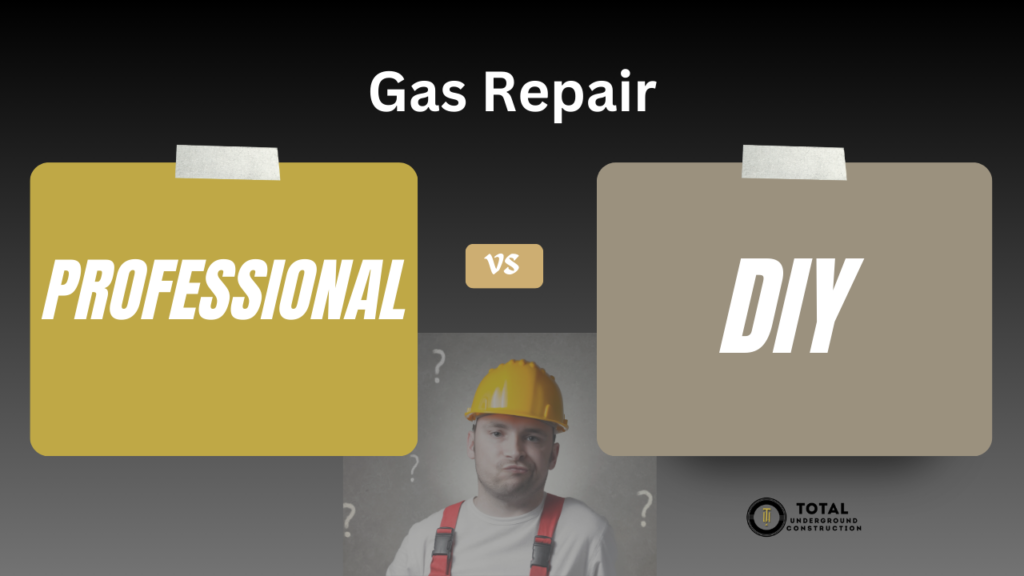
Choosing DIY vs. professional gas repair depends on the nature of the damage. Above all, safety should be your top priority when deliberating a repair solution for your gas line. DIY gas line repairs are ideal for small localized superficial problems on the gas pipe.
Nevertheless, only a certified gas line technician can determine the extent of damage and repair quality. Professional repair services offer thorough inspections, accurate diagnosis, and comprehensive repairs. Contact Total UC for gas line services for reliable and affordable gas line repairs today.
FAQs
Is it legal to repair a gas line yourself?
You can DIY repairs when the damage is insignificant, such as tightening loose components. Always have a professional gas line technician on hold in case of complications or uncertainties.
How much does it cost to hire a professional for gas line repair?
Professional gas line repairs can be as low as $250 and as high as $1,300. The cost depends on the damage type and extent, labor intensity and duration, and the number of technicians required to fix the problem.
What tools do I need for DIY gas line repair?
The gas leak detector is the first tool on the list to detect compromised sections on the gas pipe. You require a pipe wrench to loosen and tighten connections. A pipe cutter is essential to remove the compromised gas line section. Pipe fittings are a necessity to secure joints and different pipe sections. Pipe dope helps attach and strengthen the new pipe connections.
How long does professional gas line repair take?
A gas repair can take a few minutes to a couple of hours, depending on the damage location. Damages located underground may require excavation. On the other hand, surface-level damages are easy to detect and repair.

